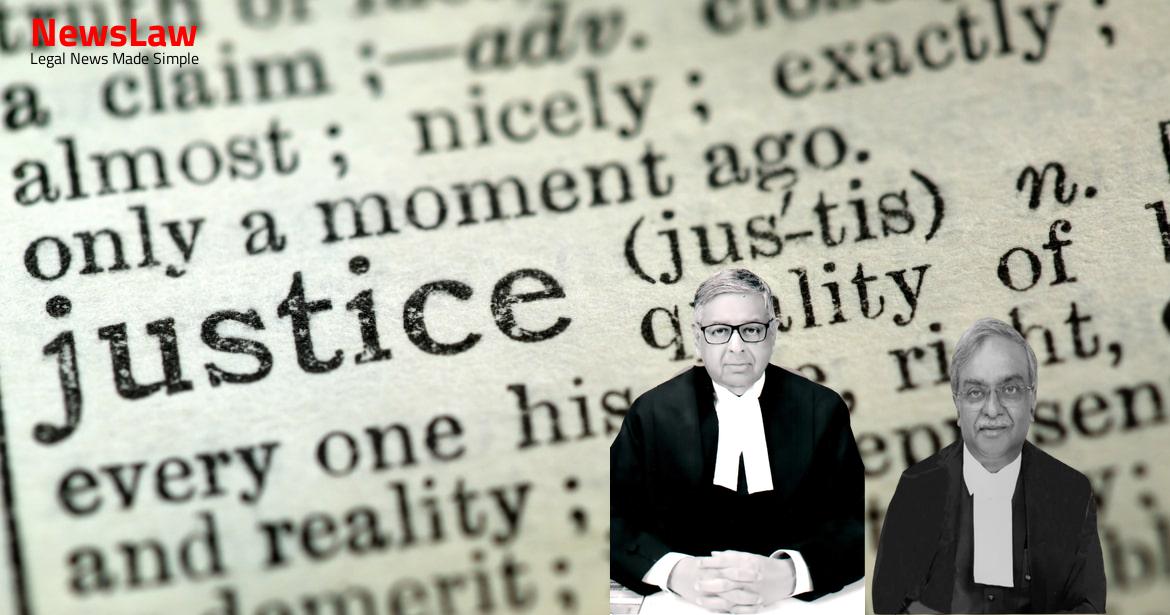This summary delves into a critical legal analysis concerning the non-disclosure of sensitive information in board proceedings. It sheds light on the importance of transparency and fair trial processes in legal adjudications, emphasizing the need for relevant information disclosure while respecting confidentiality constraints. The summary provides insights into key aspects such as the impact of sealed cover procedures on justice delivery systems and the significance of upholding principles of natural justice in legal proceedings.
Facts
- The AFT adjudicated on the validity of the selection proceedings based on material disclosed in a sealed cover
- Thirteen officers have been out of service since varying dates in 2020, 2021, and 2022
- Notice was issued on 31 January 2022 for this batch of Civil Appeals
- Twelve Civil Appeals have been instituted before the Court as a result of the AFT decision
- Relevant material regarding vacancy calculation and selection process was provided in sealed cover to the AFT
- Several officers have filed intervention applications in the case
- The AFT judgment led to the institution of twelve Civil Appeals before the Court
- The judgment in Nitisha pertained to the Indian Army where male officers were granted PC, unlike the Indian Navy where neither men nor women officers were granted PC.
- ACRs written in the last five years preceding the Board had a specific column on PC recommendation since 2015.
- Various issues considered by the second respondent included Selection Boards, baseline for consideration, categorization of officers, determination of vacancies, suitability criteria, inter-se merit criteria, conduct of Board, and analysis of Selection Board Proceedings.
- Writ petitions were dismissed in August 2021 based on principles laid down in Annie Nagaraj and Lt. Col. Nitisha, advising officers to claim reliefs before the AFT.
- The policy decision of the Union Government in 1999 governed terms for granting PC, including for SSC Officers in Education, Law, and Logistics cadres; stipulations making it prospective and applicable only to specified branches were deemed unenforceable.
- SSC women officers presently in service were entitled to PC considering vacancies as on the judgment date of Delhi High Court or AFT.
- Applications for PC were to be considered based on Regulation 203 norms – vacancies, suitability, recommendation of the Chief of Naval Staff, and inter-se merit from ACRs.
- Three points in time were considered for vacancy determination – August 2015, September 2016, and March 2020.
- AFT found no mala fides in prescribed parameters or procedures observed during Board proceedings in December 2020.
- The selection procedure adopted by the Indian Navy was detailed in the judgment.
- Officers were not granted PC due to comparative merit against limited vacancies and, in some cases, not being found suitable.
Also Read: Balancing Power and Transparency: Electoral Bonds Struck Down, Disclosure Mandated
Arguments
- The appellants argue that the sealed cover procedure followed by the AFT has resulted in prejudice as important data was not disclosed to them.
- They claim that more vacancies exist in most cadres than what is depicted in the impugned order.
- The adoption of the 60:40 ratio for PC: SSC Officers based on the AV Singh Committee report is considered flawed as other aspects of the report are yet to be implemented.
- The appellants highlight a lack of distinction between officers inducted before and after 2008 by the respondents.
- It is pointed out that the Navy’s data on vacancies at the material time was not properly calculated.
- The appellants argue that material relied upon by the AFT was submitted by Naval Authorities in a sealed cover, depriving them of the opportunity to dispute the data.
- Issues such as the highest number of vacancies not being considered, clubbing of several batches impacting vacancy assessments, and arbitrary computation of yearly vacancies are raised.
- Concerns are raised about the methodology of dividing vacancies by 15 years, the grouping of 14 batches for consideration, and the lack of individual grievances being adjudicated.
- The Naval Authorities considered the officers’ claims for PC based on parameters laid down by the court in Annie Nagaraja case.
- Vacancies were calculated taking into account cadre structure, consistent policies, future inductions and retirements, and the need for a balanced cadre structure in the Indian Navy.
- Grant of PC is governed by Regulation 203 which requires availability of vacancies in the stabilised cadre.
- Temporary vacancies and Training Drafting Leave Reserve (TDLR) vacancies were also considered for the stabilised cadre vacancies in line with the court’s judgment.
- Vacancies for stabilised cadre were calculated referencing specific dates from 2015 to 2020.
- The 60:40 ratio for PC:SSC recruitment was approved by the Government based on a committee report.
- Deficiencies in manning strength were divided over a 15-year cycle to balance PC and SSC officer service terms.
- Vacancies were allocated without favoring any specific batch to maintain a balanced cadre structure and profile.
- Following AFT’s directions, seven more vacancies were allotted to the Naval Construction Cadre for PC grant.
Also Read: Recall of Resolution Plan Approval: Legal Analysis
Analysis
- The analysis evaluates the process of non-disclosure of sensitive information in board proceedings.
- It discusses the shift of onus to the appellant to prove the necessity of information in defense.
- The practice of submitting information in a sealed cover is critiqued for perpetuating opaqueness and denying transparency.
- The lack of disclosure of board proceedings and material relied upon by AFT to the appellants is highlighted.
- Concerns regarding the impact of sealed cover procedure on the justice delivery system are raised.
- The summary also touches upon the distribution of vacancies, weightage of parameters, and the fairness of the selection process.
- The right to disclosure is not absolute, with exceptions for information on third-parties or confidential information in the securities market.
- SEBI is directed to disclose portions of the investigative report related to specific allegations in the show cause notice.
- Disclosure of information to parties in adjudication serves purposes of reliability, fair trial, transparency, and accountability.
- Relevant information must be disclosed, but unrelated sensitive information may be withheld.
- SEBI must establish if disclosure would affect third-party rights before withholding information.
- Material that could reasonably influence the decision of the authority must be disclosed, even if not relied upon in the final judgment.
- One-sided submission of material excluding the other party violates natural justice and causes prejudice.
- Non-disclosure of relevant material to the affected party while disclosing it to the adjudicating authority is a dangerous precedent.
- In this case, the AFT conducted a meticulous exercise while disposing of the OAs but failed to adhere to the principles of natural justice.
- The appellants were not able to present their objections before the AFT due to undisclosed material.
- The sealed cover procedure followed in this case highlights the risks involved.
- Due to the substantial prejudice caused by the failure to disclose relevant material, a remand to the AFT is deemed necessary.
- The AFT’s decision, while upholding the determination, did not take into account the objections raised by the appellants regarding the manner in which the exercise was conducted.
Decision
- Officers protected by interim orders of this Court will continue to have the benefit of those orders until the disposal of proceedings before the AFT and for eight weeks after the AFT’s decision.
- Some officers in the batch of appeals have been serving due to protective orders, and one officer’s tenure ends in December 2022.
- Pending applications, including for impleadment/intervention, are disposed of, and the officer whose tenure ends in December 2022 will also have the same protection.
- OAs corresponding to the appeals filed before this Court are restored for fresh adjudication by the AFT.
- The appeals are allowed, and the impugned judgment of the AFT is set aside.
- The AFT is requested to expedite the disposal of restored OAs by the end of February 2023.
Case Title: CDR. AMIT KUMAR SHARMA Vs. UNION OF INDIA (2022 INSC 1124)
Case Number: C.A. No.-000841-000843 / 2022



